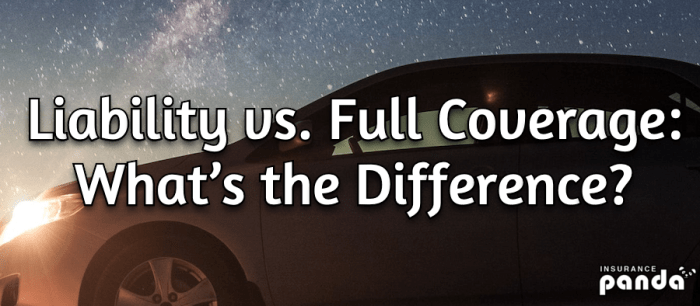What is the difference between liability and collision coverage? These are two essential types of car insurance that protect you in different ways, and understanding the distinction is crucial when deciding on the right coverage for your needs. Liability coverage protects you from financial responsibility if you cause an accident that injures someone or damages their property.
Collision coverage, on the other hand, covers damage to your own vehicle, regardless of who is at fault.
By understanding the nuances of these two types of coverage, you can make informed decisions about your insurance policy and ensure you have the protection you need in case of an accident.
Liability vs. Collision Coverage

Liability coverage and collision coverage are two important types of car insurance. They protect you financially in different situations, and understanding the difference between them is crucial when deciding what coverage you need.
Liability coverage protects you if you cause an accident that injures someone or damages their property. It covers the costs of the other driver’s medical bills, lost wages, and property damage. Collision coverage, on the other hand, covers damage to your own vehicle, regardless of who is at fault.
Liability Coverage Explained
Liability coverage is the most basic type of car insurance. It is required by law in most states, and it covers the costs of injuries and damages you cause to others. For example, if you cause an accident that injures the other driver, liability coverage would pay for their medical bills.
It also covers property damage, such as damage to the other driver’s car or any other property involved in the accident.
Collision Coverage Explained
Collision coverage is optional, but it can be very valuable. It covers damage to your own vehicle in an accident, regardless of who is at fault. For example, if you hit a tree or another car, collision coverage will pay for repairs to your vehicle.
This can be a lifesaver if you are involved in a major accident, as it can help you get your car back on the road.
Liability Coverage: What Is The Difference Between Liability And Collision Coverage?

Liability coverage is an essential part of car insurance that protects you financially if you cause an accident that results in injuries or property damage to others. It’s like having a safety net in case you make a mistake while driving.
Types of Damages Covered by Liability Coverage
Liability coverage helps cover the costs of damages you might cause to others in an accident. This includes:
- Medical expenses:If you injure someone in an accident, liability coverage can help pay for their medical bills, including hospital stays, surgeries, and rehabilitation.
- Lost wages:If someone is unable to work due to injuries from the accident, liability coverage can help compensate them for their lost income.
- Property damage:If you damage someone’s car, house, or other property, liability coverage can help pay for repairs or replacement costs.
- Pain and suffering:In some cases, liability coverage can also help pay for emotional distress, pain, and suffering caused by the accident.
How Liability Coverage Protects You, What is the difference between liability and collision coverage?
Liability coverage works by providing financial protection against claims made against you for damages you cause in an accident. When you purchase liability coverage, you’re essentially agreeing to have your insurance company cover the costs of these claims, up to the limits you choose.
Examples of Situations Where Liability Coverage Would Be Applicable
Imagine you’re driving to work and accidentally rear-end another car at a stoplight. The driver in front of you is injured and their car needs repairs. In this situation, liability coverage would help cover the costs of their medical bills, lost wages, and car repairs.Here are some other examples of situations where liability coverage could be helpful:
- You accidentally back into a parked car while pulling out of a parking spot.
- You run a red light and hit another car, causing injuries to the driver and passengers.
- You lose control of your car and hit a pedestrian.
Collision Coverage

Collision coverage is a type of car insurance that covers damages to your vehicle if you are involved in an accident, regardless of who is at fault. This means that even if you are responsible for the accident, your insurance will help pay for repairs to your car.
Damages Covered by Collision Coverage
Collision coverage helps pay for repairs to your car, including:
- Damage to the body of your car: This includes things like dents, scratches, and broken windows.
- Damage to the engine or other mechanical parts: This could include damage from a collision, such as a bent axle or a broken transmission.
- Damage to the interior of your car: This includes things like torn upholstery, broken seats, and damaged dashboards.
Collision coverage also covers the cost of replacing your car if it is totaled in an accident. A car is considered totaled if the cost of repairs exceeds the value of the car.
Examples of Situations Where Collision Coverage Would Be Applicable
Here are some examples of situations where collision coverage would be applicable:
- You hit a tree or a pole: If you lose control of your car and hit a fixed object, collision coverage can help pay for the repairs.
- You are involved in a rear-end collision: If another car hits you from behind, collision coverage can help pay for the repairs to your car, even if you were not at fault.
- You are involved in a head-on collision: If you hit another car head-on, collision coverage can help pay for the repairs to your car, even if you were not at fault.
Key Differences
Liability and collision coverage are two types of car insurance that protect you in different situations. It’s important to understand the key differences between these coverages to make informed decisions about your insurance needs.Liability coverage protects you financially if you’re at fault in an accident that causes damage to another person’s property or injuries to another person.
Collision coverage protects you if your car is damaged in an accident, regardless of who is at fault.
Situations Where Coverage Applies
The main difference between liability and collision coverage is the situations where they apply.
- Liability coveragekicks in when you cause damage to someone else’s property or injure someone else in an accident.
- Collision coverageapplies when your car is damaged in an accident, regardless of whether you are at fault or not.
For example, if you rear-end another car and cause damage to their vehicle, your liability coverage would pay for the repairs to their car. However, if you are in an accident with another vehicle and your car is damaged, your collision coverage would pay for the repairs to your car.
Factors to Consider When Choosing Coverage
Several factors can help you decide whether to purchase liability or collision coverage, including:
- Your financial situation:If you can afford to pay for repairs to your car out of pocket, you may not need collision coverage. However, if you can’t afford to pay for repairs, collision coverage can help you avoid a large financial burden.
- The age and value of your car:If you have an older car with a lower value, it may not be worth purchasing collision coverage. This is because the cost of repairs could exceed the value of your car. However, if you have a newer car with a higher value, collision coverage can be a valuable investment.
- Your driving history:If you have a history of accidents or traffic violations, you may be more likely to need collision coverage. This is because you are more likely to be involved in an accident and need to have your car repaired.
Role of Deductibles
A deductible is the amount of money you are responsible for paying out of pocket before your insurance coverage kicks in. Both liability and collision coverage have deductibles.
- Liability coverage deductiblesare typically not applicable because liability coverage pays for damages to others, not your own car.
- Collision coverage deductiblesare the amount you must pay out of pocket before your insurance company will pay for the remaining repair costs. For example, if you have a $500 deductible and your car sustains $2,000 in damage, you would pay $500, and your insurance company would pay the remaining $1,500.
Higher deductibles typically result in lower insurance premiums. So, you can choose a deductible that fits your budget and risk tolerance.
Considerations for Choosing Coverage
Choosing between liability and collision coverage involves weighing the benefits and drawbacks of each option. Your decision should consider your driving history, the age and value of your vehicle, and your personal financial situation.
Impact of Coverage Choices on Premiums
Your choice of coverage will directly affect your insurance premiums. Liability coverage is generally less expensive than collision coverage. This is because liability coverage only protects you against claims from others, while collision coverage protects you against damage to your own vehicle.
For example, if you have a newer car with a higher value, collision coverage will likely be more expensive, as it would cover the cost of repairs or replacement in the event of an accident. However, if you have an older car with a lower value, collision coverage may be less expensive.
Factors Influencing Coverage Choices
- Driving History:A clean driving record with no accidents or violations may make you eligible for lower premiums on both liability and collision coverage. Conversely, a history of accidents or traffic violations could lead to higher premiums.
- Vehicle Age:As your vehicle ages, its value decreases, making collision coverage less valuable. Older vehicles may not be worth the cost of repair or replacement after an accident. In such cases, you may choose to drop collision coverage and rely solely on liability coverage.
- Personal Financial Situation:Your financial situation plays a role in determining the level of coverage you can afford. If you have a limited budget, you may opt for minimum liability coverage, which is typically the most affordable option. However, if you have a higher income or significant assets, you may choose higher limits on your liability coverage to protect yourself from potentially costly lawsuits.
Ending Remarks

In conclusion, liability and collision coverage are two vital components of car insurance, each offering distinct protection. Liability coverage shields you from financial responsibility for accidents you cause, while collision coverage safeguards your own vehicle from damage. Choosing the right coverage depends on your individual needs, driving history, vehicle age, and financial situation.
Consulting with an insurance professional is always recommended to tailor your policy to your specific circumstances.
FAQs
What is a deductible?
A deductible is the amount you pay out-of-pocket before your insurance coverage kicks in. For example, if you have a $500 deductible for collision coverage and your car sustains $2,000 in damage, you would pay the first $500 and your insurance would cover the remaining $1,500.
Do I need both liability and collision coverage?
It depends on your situation. Liability coverage is generally required by law, but collision coverage is optional. If you have an older car with a low value, it might not make sense to pay for collision coverage. However, if you have a newer car or a loan on your vehicle, collision coverage can be a wise investment.
How can I lower my car insurance premiums?
There are a few ways to potentially lower your premiums, including: improving your driving record, increasing your deductible, taking a defensive driving course, bundling your car insurance with other policies, and comparing quotes from different insurers.
